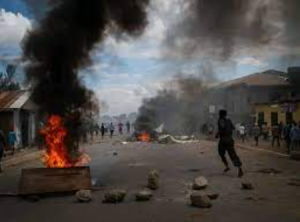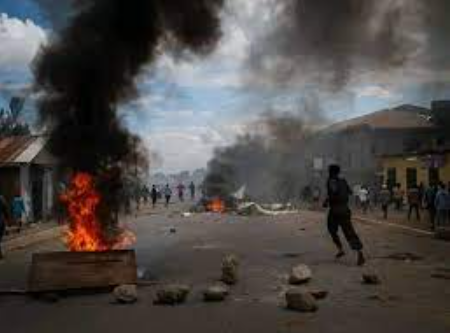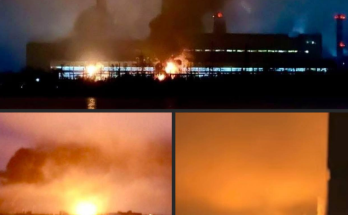
U.S. Embassy in Tanzania Issues Nationwide Security Alert Amid Widespread Demonstrations
The U.S. Embassy in Tanzania has issued a rare nationwide security alert following the eruption of large, coordinated demonstrations spreading across multiple regions of the country. The advisory, delivered to American citizens and all U.S. government personnel stationed in Tanzania, warns of unpredictable protests, heavy police presence, and potential disruptions to daily movement. In an unusual escalation, embassy leadership has instructed all U.S. government employees to shelter in place at their residences until further notice.
The demonstrations—described by local observers as some of the most geographically widespread in recent years—have reportedly erupted in response to a variety of political, social, and economic issues. Accounts vary depending on the region, with some areas experiencing peaceful marches and others seeing confrontational standoffs between protestors and security officers. The diversity of motivations, combined with the speed at which gatherings formed in several cities and towns, has created an environment of significant uncertainty.
According to the embassy’s statement, security services in Tanzania are “actively responding” to protest activity, deploying officers, vehicles, and in some cases non-lethal crowd-control tools. Roadblocks, checkpoints, and temporary closures of busy corridors have been reported, particularly in Dar es Salaam, Arusha, Mwanza, and Dodoma. While information remains fluid, the embassy emphasized that heightened police movement could affect anyone attempting to travel within or between regions.
The advisory urges American citizens already in Tanzania to remain vigilant, avoid large crowds, and monitor developments through local media, official Tanzanian updates, and U.S. embassy notifications. While no direct threats against U.S. citizens have been identified, the embassy stresses that spontaneous demonstrations carry inherent risks—particularly in areas where security forces are responding rapidly.
Residents in major urban centers described an air of tension throughout the day. Busy marketplaces saw reduced foot traffic, and some businesses opted to close early to avoid potential clashes. In certain areas, loudspeaker announcements from local officials advised people to remain at home unless travel was essential. Taxi and bus operators reported altered routes and extended wait times due to road closures and the concentration of officers in central districts.
The Tanzanian government, for its part, has urged calm. Early statements from local authorities emphasized their commitment to maintaining order while acknowledging citizens’ constitutional right to assemble. At the same time, law enforcement has established a visible presence in major gathering points to prevent unrest from escalating. Videos circulating on social media showed police vehicles moving in organized convoys, while other clips captured crowds chanting, holding signs, and marching through public squares.
For many observers, the embassy’s decision to direct U.S. personnel to shelter in place is the clearest indication of the seriousness with which American officials view the evolving situation. Shelter-in-place orders are typically reserved for periods when movement could expose employees to significant risk, whether due to civil unrest, security operations, or unpredictable events. The guidance requires staff to remain inside their homes, secure all entry points, avoid windows, and stay off the roads unless absolutely necessary for safety.
The embassy’s alert outlines several recommended precautions for U.S. citizens in Tanzania:
-
Avoid demonstration areas, even if protests appear calm, as conditions can deteriorate quickly.
-
Refrain from photography or recording of demonstrations or police activity, which could be misinterpreted.
-
Keep a charged phone, emergency supplies, and identification readily accessible.
-
Plan alternate routes for essential travel, as major roads may be blocked without notice.
-
Maintain contact with friends or family to inform them of your safety and location.
-
Enroll in or update information through the Smart Traveler Enrollment Program (STEP) to ensure the embassy can deliver timely alerts.
The alert also notes that communications infrastructure can become strained during widespread public gatherings. Some mobile networks reportedly experienced slower data speeds in parts of Dar es Salaam and Arusha during peak protest periods. This possibility of reduced connectivity underscores the embassy’s advice to prepare backup communication methods whenever possible.
For expatriates, foreign workers, and tourists, the situation has introduced a sudden element of unpredictability. While Tanzania is known for political stability relative to its neighbors, its urban centers occasionally see protests linked to economic issues, electoral disputes, or regional grievances. However, the current demonstrations span a wider area than usual, drawing heightened attention from both domestic and international observers.
Local reactions to the embassy’s alert have been mixed. Some residents expressed concern that the international advisory might amplify fears, while others felt it reflected the seriousness of the moment. A shopkeeper in Arusha noted that “you can feel the tension, even if you’re not part of the protests,” adding that most people simply want to avoid being caught in the middle of a confrontation. Meanwhile, a university student in Dar es Salaam said the demonstrations stem from frustrations that have been “building for a long time,” and that people are determined to have their voices heard.
As evening approached, the situation remained highly fluid. Some protest sites began to disperse voluntarily, while others saw growing crowds. Security forces continued to reposition in response to emerging hotspots, and local media reported additional gatherings forming in smaller towns. The U.S. Embassy emphasized that it would issue further updates as needed and reminded citizens to remain attentive to new instructions.
For now, the embassy’s shelter-in-place directive stands as an important signal that foreigners in Tanzania should treat the current environment with caution. Whether the demonstrations continue, escalate, or begin to subside over the coming days remains uncertain. What is clear is that Tanzanians across the country have entered a moment of heightened political expression—and that U.S. officials are preparing for the possibility of rapid developments.
In the meantime, American citizens are urged to practice situational awareness, stay informed, and minimize non-essential movement. The hope among both local residents and the international community is that the demonstrations will remain peaceful and that the government’s response will prioritize the safety of civilians. As Tanzania navigates this period of national tension, the U.S. Embassy will continue to serve as a lifeline of information for Americans seeking clarity and protection

